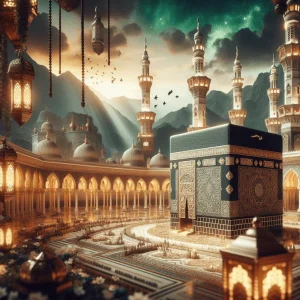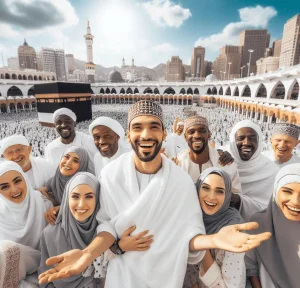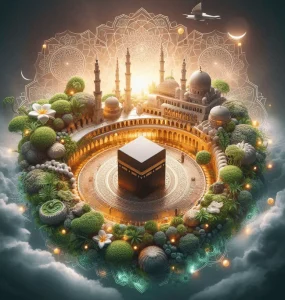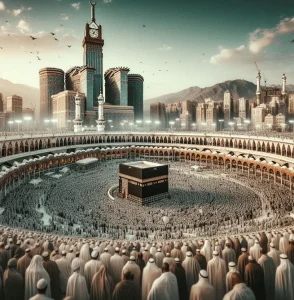Table of Contents
Islamic Celebrations In the intricate fabric of Islamic Celebrations, there lies a vibrant mosaic of traditions, customs, and spiritual significance. Spanning across various cultures and regions, these celebrations not only commemorate historical events but also foster community cohesion and spiritual rejuvenation. Let’s embark on a journey through the Islamic Celebrations, unraveling their essence and significance.

Eid al-Fitr: The Feast of Breaking the Fast
Among the most anticipated Islamic Celebrations is Eid al-Fitr, marking the end of Ramadan, the holy month of fasting. As the crescent moon graces the sky, Muslims around the world indulge in a joyous feast, celebrating the completion of a month-long spiritual journey. The day commences with special prayers at mosques, followed by gatherings with family and friends, adorned in their finest attire.
Eid al-Adha: The Festival of Sacrifice
Eid al-Adha, also known as the Feast of Sacrifice, commemorates the willingness of Prophet Ibrahim to sacrifice his son as an act of obedience to God. This auspicious occasion embodies the spirit of sacrifice, charity, and gratitude. Families come together to perform the Eid prayer and share the blessings by distributing meat among relatives, neighbors, and the less fortunate.
Mawlid al-Nabi: Celebrating the Birth of the Prophet
Mawlid al-Nabi is a commemoration of the birth of Prophet Muhammad, a time of reflection, gratitude, and spiritual enlightenment. It is observed with recitations of poetry, narrations of the Prophet’s life, and acts of charity. In some regions, colorful processions and illuminations adorn the streets, showcasing the love and reverence for the Prophet.
Laylat al-Qadr: The Night of Power
Laylat al-Qadr, often referred to as the Night of Power, holds immense significance in Islam as the night when the Quran was first revealed to Prophet Muhammad. Observed in the last ten days of Ramadan, particularly on the odd-numbered nights, it is a time of intense worship, supplication, and seeking divine blessings. Muslims engage in prayers, recitation of the Quran, and heartfelt devotion, seeking forgiveness and spiritual elevation.
Ashura: Commemorating Historical Events
Ashura commemorates various significant events in Islamic history, including the day when Prophet Musa and the Israelites were saved from Pharaoh’s tyranny and the martyrdom of Imam Hussain, the grandson of Prophet Muhammad. It is a day of solemn reflection, self-discipline, and remembrance of sacrifices. Some communities engage in voluntary fasting, while others participate in processions and acts of charity.
Ramadan: The Month of Spiritual Reflection
While not solely a celebration, Ramadan holds a central place in Islamic spirituality. It is a month of fasting, prayer, and self-reflection, during which Muslims abstain from food, drink, and worldly pleasures from dawn until sunset. Beyond its physical rigors, Ramadan is a time for spiritual purification, seeking forgiveness, and strengthening one’s connection with Allah.
Hijri New Year: Marking the Islamic Calendar
The Hijri New Year marks the beginning of the Islamic lunar calendar, signifying a time of renewal, reflection, and new beginnings. It commemorates the migration (Hijra) of Prophet Muhammad from Mecca to Medina, Islamic Celebrations a pivotal event in Islamic history. Muslims reflect on the Hijra’s lessons of faith, perseverance, and community building, setting intentions for the year ahead.
Jumu’ah: Gathering for Friday Prayer
Jumu’ah, or Friday prayer, is a weekly congregational prayer in Islam, considered a sacred day for Muslims. It serves as a spiritual rendezvous, where believers gather at mosques to listen to the sermon (khutbah) and engage in communal worship. Jumu’ah holds a special significance, offering an opportunity for reflection, rejuvenation, and communal bonding.
Islamic Celebrations
In the kaleidoscope of Islamic Celebrations, each event reflects the tapestry of Islamic faith, culture, and heritage. From the joyous feasts of Eid al-Fitr to the solemn commemorations of Ashura, these celebrations enrich the lives of Muslims, fostering a sense of unity, gratitude, and devotion. As we embrace the diversity of Islamic Celebrations, let us cherish the values they uphold and the lessons they impart, weaving a tapestry of love, compassion, and spiritual enlightenment.






More Stories
Making the Most of Your Arrival: A Guide to Private Transportation from the Orlando Airport to Disney World
Halal Travel: More Than a Trend, It’s a Movement Toward Halal Travel Exploration
Halal Adventures Await: Unlocking Hidden Gems in Global Travel